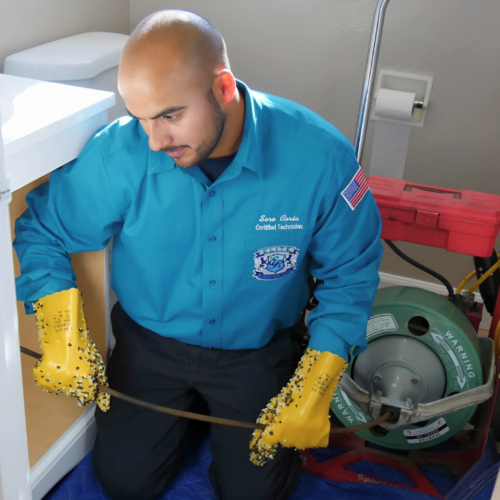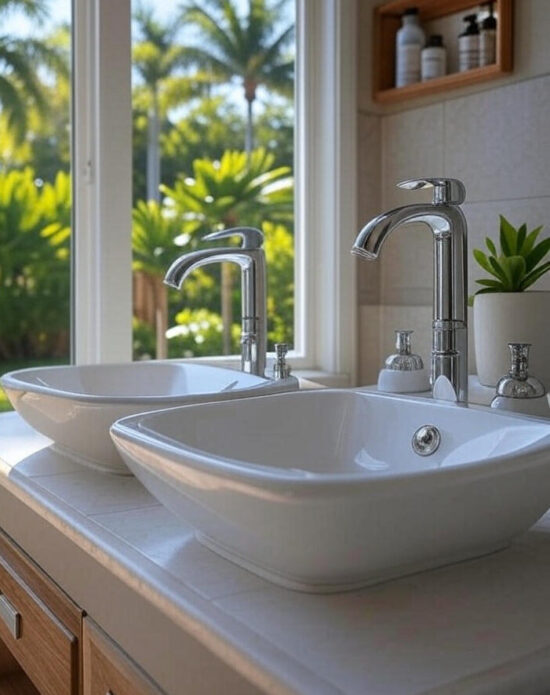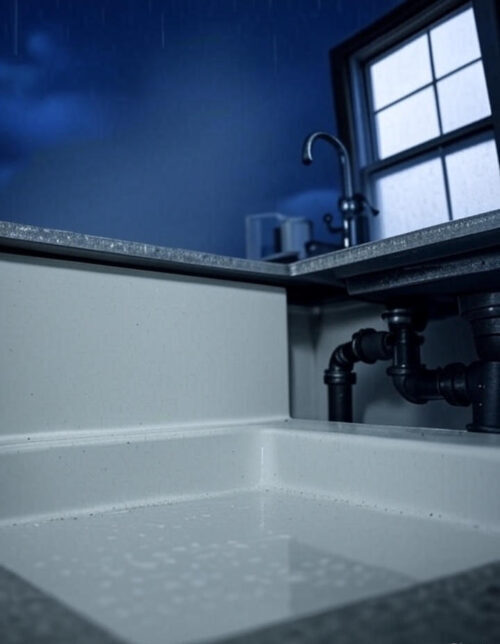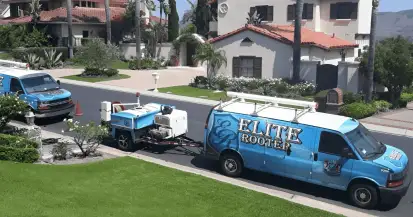Imagine this: you have guests coming over, and your kitchen sink is draining more slowly than usual, leaving behind a murky puddle of water. You grab a plunger, some store-bought chemical cleaner, and maybe even a wire hanger — determined to fix it yourself. But instead of solving the problem, you end up with worsened clogs, strange pipe noises, or even leaks under the sink. This is an all-too-common scenario when homeowners attempt to clear drains themselves without understanding the risks. In this guide, we’ll explore the common DIY drain cleaning mistakes, why these errors occur, how to avoid them, and provide helpful drain cleaning tips.
How DIY Drain Cleaning Can Go Wrong
Most people attempt DIY drain cleaning to save money and avoid the hassle of scheduling a plumber. With dozens of online tutorials and quick fixes available, it’s easy to feel confident about tackling the problem yourself.
However, improper techniques, tools, and chemicals often worsen the clog or damage your pipes. Whether it’s excessive force, corrosive substances, or ignoring signs of deeper plumbing issues, the consequences of a wrong move can be costly.
Before you reach for that plunger or bottle of chemical cleaner, it’s crucial to understand the common drain cleaning mistakes people make — and how to avoid homemade drain cleaner dangers like damaging pipes further.
Common DIY Drain Cleaning Mistakes
Below are common DIY drain cleaning mistakes you’ll want to avoid.
Using excessive force with a plunger
Using too much force can damage the pipe joints, seals, or even the pipes themselves, especially in older homes.
The safest alternative is to use controlled, steady pressure when plunging. Ensure there is enough water in the sink or tub to cover the plunger head, and use the correct plunger type (a cup plunger for sinks, a flange plunger for toilets). If several attempts don’t work, stop to avoid further pipe damage from drain cleaning and call a pro.
Overusing chemical drain cleaners
Chemical drain cleaners are marketed as fast and easy solutions for clogs. However, these products contain harsh chemicals that can erode the interior of pipes, especially those made of PVC or older metal. The more frequently you use them, the more your plumbing is at risk of chemical drain cleaner damage, like corrosion and leaks. Avoid harsh chemical drain cleaners like Drano or Liquid-Plumbr. They can corrode pipes, harm the environment, and create toxic fumes.
Safe alternative: Opt for safe drain cleaning methods, such as natural solutions. A simple home remedy for clogged drains is to pour a mixture of baking soda and vinegar down the drain, let it fizz, and then flush with warm water.
Improper use of a drain snake
Drain snakes, also known as augers, are popular tools for clearing clogs — but only if used correctly. Improper use of a drain snake can cause scratches, punctures, or cracks in pipes. Twisting too forcefully or using a snake that’s too large for your pipes can lead to permanent damage.
Safe alternative: If you’re using a manual snake, gently feed it into the drain without forcing it. If you encounter resistance that won’t budge, it’s time to call a professional drain cleaner. They’ll have the appropriate tools, like hydro jetting and video camera techniques, for safely navigating your plumbing.
Mixing different drain cleaning chemicals
Thinking that combining chemical solutions will double their power is one of the most dangerous DIY plumbing mistakes. Mixing different drain cleaning chemicals can create toxic fumes or chemical reactions that produce heat, potentially causing pipe damage or even personal injury.
Safe alternative: Stick to one method at a time. If a chemical cleaner fails, do not pour a different product on top of it. Instead, flush the system thoroughly with water and consult a professional.
Ignoring the root cause of clogs
DIY methods often focus on treating the symptom without addressing the underlying cause. Sometimes, the clog is a sign of a larger issue, such as tree root intrusion, pipe corrosion, or a poor pipe slope. Applying quick fixes repeatedly can mask serious plumbing problems, delaying proper treatment and worsening the situation.
Safe alternative: If clogs continue to recur, schedule a professional drain inspection. Experts can use video cameras to check for deeper issues and recommend long-term solutions.
Using boiling water incorrectly
Many home remedies for clogged drains suggest pouring boiling water down the drain to dissolve grease or soap scum. While boiling water may work on metal pipes, it can warp or damage PVC pipes, loosen joints or seals, and lead to leaks.
Safe alternative: Use warm, not boiling, water for minor clogs, especially in plastic piping systems. For greasy clogs, warm water combined with dish soap can help break down residue more gently.
Tips for Safe DIY Drain Cleaning
If you want to attempt DIY drain maintenance, here are some safe ways to clean drains without risking damage:
- Install drain screens to catch hair, soap scum, and food particles before they enter your pipes.
- Flush drains weekly with warm water to prevent buildup.
- Use the baking soda and vinegar method monthly as a preventive maintenance measure.
- Avoid flushing anything but toilet paper and human waste down the toilet.
- Know your limits — if plunging or snaking doesn’t resolve the issue, stop before causing damage.
Knowing how to avoid damaging pipes is crucial. If you’re unsure, consult a professional for proper care and guidance.
Consequences of DIY Drain Cleaning Mistakes
Taking drain cleaning into your own hands without the proper knowledge can lead to serious consequences:
- Financial costs: Damaged pipes, corroded joints, or worsened clogs can require expensive repairs or full pipe replacements.
- Health risks: Improper chemical use can lead to toxic fumes or skin burns. Worse, if you damage a drainpipe, it could result in unsanitary sewage backups.
- Environmental impact: Many chemical drain cleaners are harmful to the environment, contaminating water supplies and harming wildlife. Choosing safer, eco-friendly methods is better for your home and the planet.
Most Common Questions
What are the dangers of using chemical drain cleaners?
Chemical drain cleaner damage includes pipe corrosion, the release of toxic fumes, and environmental harm. Safe drain cleaning methods, such as using vinegar and baking soda, are gentler alternatives.
Can plunging damage pipes?
Yes, excessive or improper plunging can damage pipe joints and seals. Always use gentle, controlled plunging with the correct plunger type.
How do I know if I damaged my pipes while cleaning the drain?
Signs of pipe damage include new leaks, low water pressure, unusual gurgling sounds, or persistent clogs even after cleaning attempts.
How do I know if I need a professional plumber?
If you have persistent clogs, multiple blocked drains, foul odors, or suspect tree root intrusion, call a professional drain cleaner.
Are natural drain cleaning methods effective?
Yes, home remedies for clogged drains, such as baking soda and vinegar, work well for minor clogs without risking pipe damage.
Can boiling water unclog a drain?
Boeing water can sometimes unclog a drain but more often will damage PVC pipes. Use warm water to dissolve grease clogs and avoid compromising your plumbing.
Call Elite Rooter
It’s easy to see why homeowners attempt DIY solutions when faced with a clog, but using the wrong approach can lead to common drain cleaning errors that cause more harm than good. By understanding the risks and using safe ways to clean drains, you can avoid DIY drain cleaning mistakes and protect your home’s plumbing.
If you’re facing persistent clogs or just want peace of mind, trust the experts at Elite Rooter. We know how to unclog a drain safely and effectively, preventing damage and ensuring long-term solutions. Call Elite Rooter today for professional service — and don’t forget to share this post with friends or family who may be making these common DIY plumbing mistakes!




